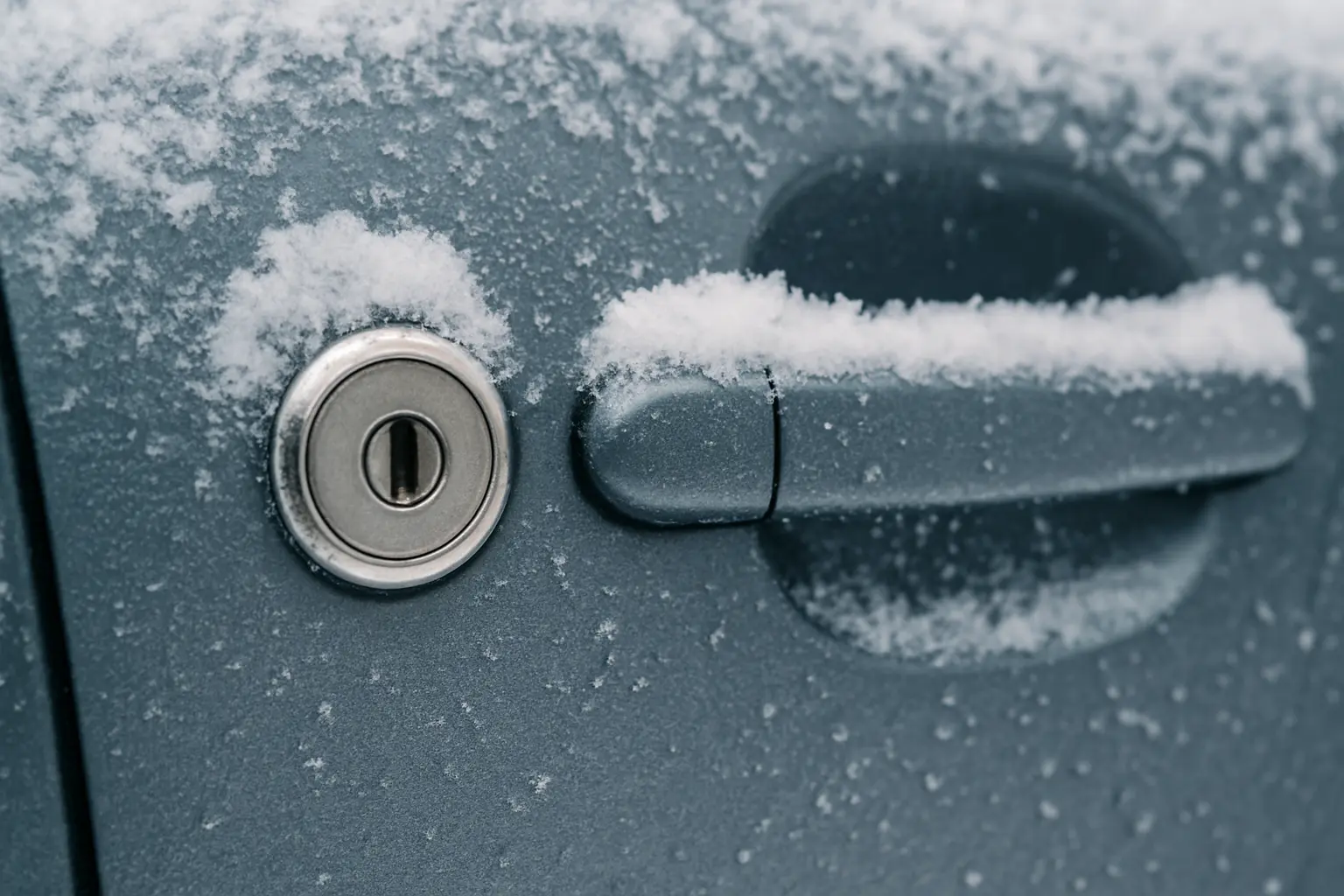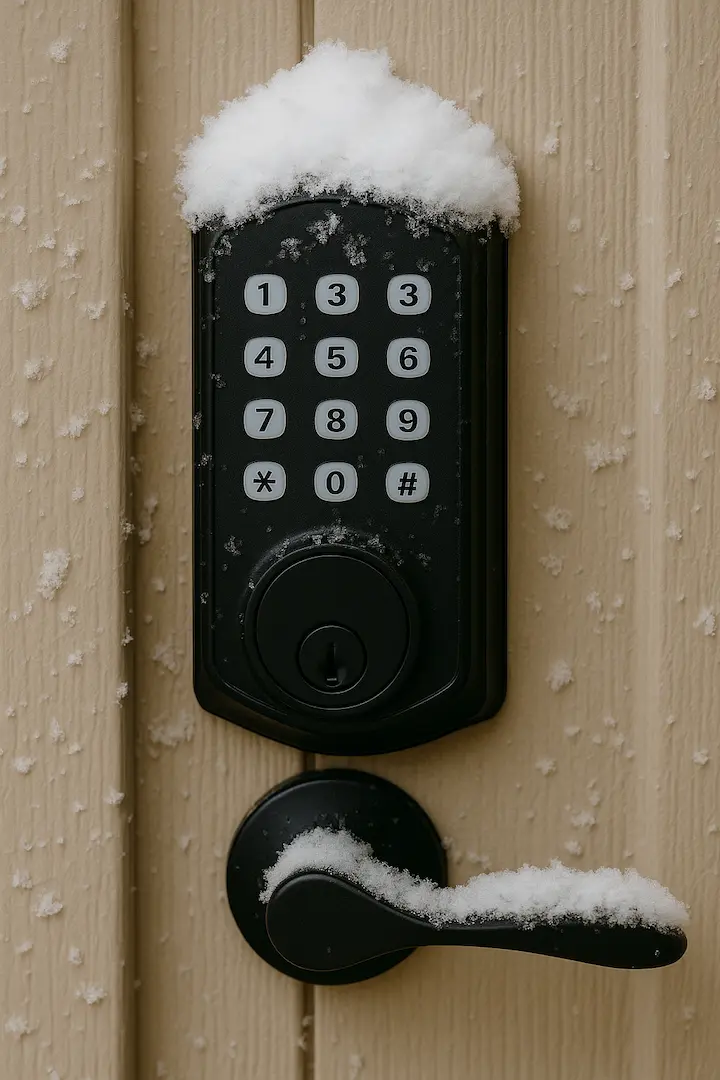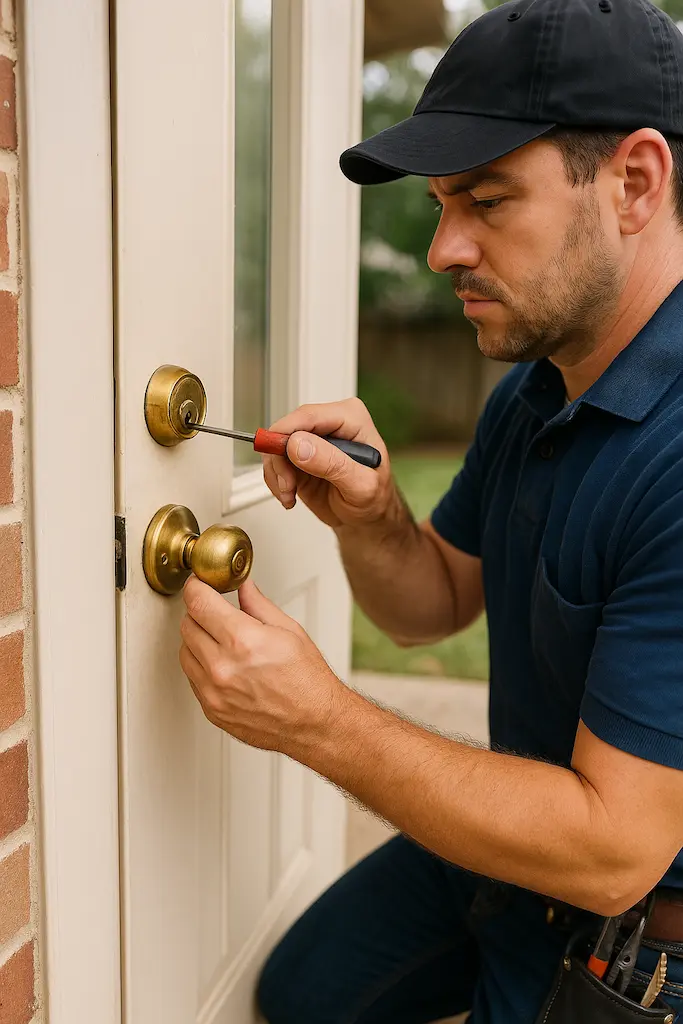1. Frozen door locks
One of the most frustrating winter lock problems is a frozen door lock. When temperatures drop below freezing, moisture inside the cylinder hardens into ice, blocking the keyway and leaving you stuck outside. Many homeowners instinctively try hot water, but that only makes things worse - the water seeps deeper and refreezes.
The safest solution is to use a lock de-icer spray, which melts the ice without harming the lock’s internal pins. In an emergency, an alcohol-based hand sanitizer on the key can also help because the alcohol lowers the freezing point. Locksmiths often recommend preparing before the season starts, rather than waiting until the first freeze.
- Apply graphite or silicone lubricant to exterior locks in late fall.
- Keep a small bottle of lock de-icer in your car, purse, or winter coat pocket.
- Avoid hot water - it causes re-freezing and can damage the metal.
- If the lock stays frozen, call a local locksmith to prevent key breakage.
“Every winter we get dozens of calls about frozen locks. Prevention - a quick spray of lubricant in October - saves most people from standing outside in the cold with groceries in hand.”

2. Keys that become brittle and snap
When temperatures drop, metal becomes brittle, and old or weakened keys are far more likely to snap inside the lock. The problem is common in cold climates across the U.S. where house keys, office keys, and even car keys face daily stress. Once a piece of key breaks inside the cylinder, the lock may become completely unusable until a professional removes it.
Locksmiths recommend checking your keys before winter begins. If you notice cracks, bends, or heavy wear, get a duplicate made early and retire the old one. Always keep a spare key in a safe location - either with a family member, in a coded lockbox, or securely stored inside your vehicle. For more background on why cold weather damages metals, you can review this Scientific American explanation of metal brittleness in freezing temperatures .
- Inspect all your household and vehicle keys before the first freeze - replace any that show cracks or bending.
- Store at least one spare key outside the house in a secure lockbox, or with a trusted neighbor.
- If a key snaps inside the lock, avoid forcing it out - call a licensed locksmith immediately to prevent permanent cylinder damage.
If your keys have already broken or you want preventive help, our locksmith experts in Boston can replace keys, extract broken pieces, and recommend winter-safe solutions that save you from costly emergencies during the cold season.
- Inspect your keys before winter - replace worn or bent ones.
- Always keep a spare key in a safe spot.
- If a key snaps inside, call a professional locksmith instead of forcing it out.
3. Car locks freezing shut
Few things are more stressful than running late on a freezing morning only to discover your car door lock is frozen. Vehicle locks are especially vulnerable because they’re constantly exposed to rain, snow, and road moisture that can freeze solid overnight. Trying to jam or force the key often results in a snapped key and an even bigger problem.
The best defense is prevention. A quick spray of silicone lubricant in the fall protects the lock’s cylinder and reduces moisture build-up. If the lock is already frozen, gently warming the key (using body heat or a pocket hand-warmer) before inserting it can help release the ice without damaging the mechanism. Always remember - forcing the key will likely break it inside the lock.
- Spray silicone lubricant into the cylinder before the first freeze.
- Warm the key gently with body heat or a hand-warmer - but never force it.
- Keep a lock de-icer spray in your glove compartment for emergencies.
- If the lock remains stuck, call a local automotive locksmith to avoid costly damage.

“In winter, one of the top roadside calls we get is for frozen car locks. Drivers who keep a $5 lock de-icer in their glovebox rarely need us - it’s the cheapest insurance you can buy.”
4. Smart lock batteries draining quickly
One of the most overlooked winter lock problems is how fast smart lock batteries lose power in freezing temperatures. Cold weather reduces the efficiency of standard alkaline batteries, causing them to die weeks or even months earlier than expected. Many homeowners discover this the hard way - standing outside in the cold with a keypad that no longer responds. Unlike traditional deadbolts, a smart lock depends entirely on electronics, so a drained battery can lock you out instantly.
The best solution is prevention. Locksmiths recommend switching to lithium batteries, which are proven to last much longer in sub-zero conditions. It’s also smart to check battery levels in the lock’s app or through the indicator lights regularly. For a detailed technical explanation of why cold drains batteries faster, see this guide from the U.S. Department of Energy .
- Use lithium batteries - they last longer in freezing conditions.
- Check battery levels in the app or via indicator lights at least once a month in winter.
- Always keep one physical backup key in case of sudden power loss.
- Replace batteries before the first freeze instead of waiting until they die completely.
If your smart lock has already stopped working or you want help preparing before the cold season, our locksmith team in Boston can replace batteries, reprogram locks, and make sure you always have a reliable backup so you’re never locked out in freezing weather.
5. Wooden doors swelling from moisture
Winter brings not only cold air but also excess moisture from snow and rain. Wooden doors naturally absorb this humidity, causing them to swell and press tightly against the frame. The result? A stubborn door that refuses to close properly or a lock that won’t turn smoothly just when you need it most. Homeowners often mistake this issue for a faulty lock, when in reality the wood itself is the culprit.
The good news is that this is a common seasonal problem with simple solutions. Regular maintenance before winter can minimize the swelling and protect both the door and the lock. A little attention now can save you from expensive locksmith calls or even a damaged door later.
- Lubricate hinges and strike plates to reduce friction.
- Replace worn or cracked weatherstripping to keep excess moisture out.
- Seal or repaint exposed wood surfaces for extra protection.
- If swelling becomes severe, plane the door edge slightly to restore alignment.
- Call a local locksmith or carpenter if the door refuses to close properly - forcing it may damage the lock.
“Many winter lockouts happen because the door frame swells, not because the lock is broken. Preventive care for the door can keep your locks working smoothly all season long.”
Professional help when you need it
Routine maintenance can solve many lock issues, but if the same problems keep returning, it’s risky to wait until a freezing night leaves you stranded outside. A certified locksmith in Boston can inspect your doors, repair hidden damage, and make sure your locks stay reliable throughout the entire winter season. Getting help early often saves both time and money compared to an emergency lockout in the middle of the night.
“As locksmiths, we always recommend homeowners prepare before the first freeze. A few small steps can save you from a midnight lockout in sub-zero temperatures.”
